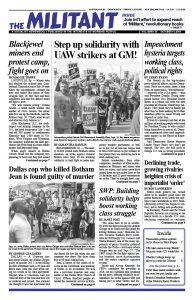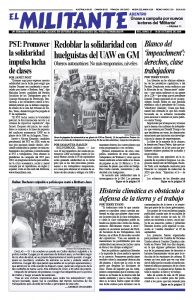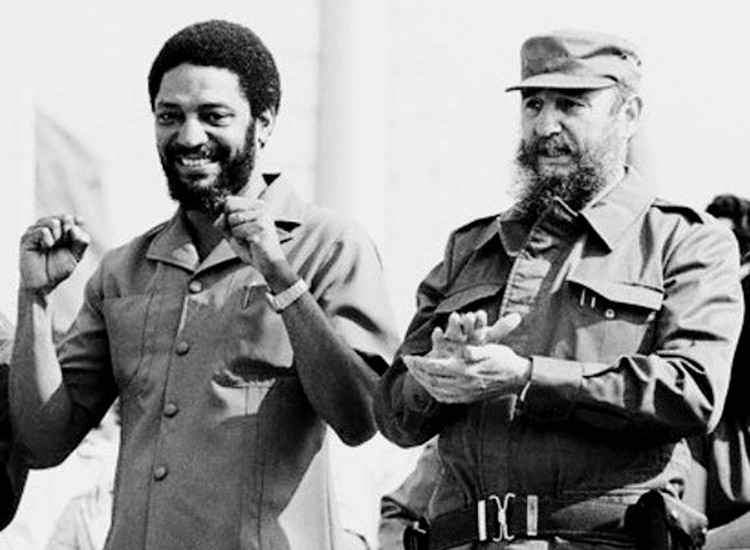Fidel Castro: Nothing Can Stop the Course of History, one of Pathfinder’s Books of the Month for October, is a wide-ranging interview by Jeffrey M. Elliot and Mervyn M. Dymally with the central leader of the Cuban Revolution. The excerpts are from a discussion on Grenada. Maurice Bishop led the 1979 Grenadian Revolution as workers and peasants took power into their own hands. The Cuban government viewed Bishop’s leadership, and the revolution on this small English-speaking Caribbean island, as a powerful reinforcement. In October 1983, the workers and farmers government there was overthrown. Bishop and others were murdered in a Stalinist coup led by Bernard Coard that paved the way for a U.S. military invasion the following week. Copyright © 1986. Reprinted by permission of Pathfinder Press.
Mervyn M. Dymally: Let’s shift to Grenada. How do you explain the failure of the socialist revolution in Grenada? Was failure inevitable?
Fidel Castro: In effect, what was taking place in Grenada was not a socialist revolution, but a process of social changes. I believe that the basic factor that opened the door — that served the United States a pretext on a silver platter for invading that country, at a lower political price — were the activities of an ambitious and extremist sectarian group. In my view, the main responsibility for the domestic situation created there lies with [Bernard] Coard. An alleged theoretician of the revolution who had been a professor of Marxism in Jamaica, he profited from his reputation as a theoretically well-prepared man and used his reputation as a theoretician to promote his personal ambitions and conspire against Bishop. …
[I]t is not impossible for the disease of extremism to take hold of some people; this often occurs even among petty-bourgeois elements who draw up utopias and try to put them into practice. Unfortunately, there have also been cases of extremism in other revolutionary processes. In Grenada, however, I don’t believe it was an extremist policy on Coard’s part. Rather, I think, personal ambition was Coard’s basic motivation and what really confused many people in whom he inculcated extremist ideas from supposedly revolutionary positions, as a means of gaining support. In the name of the purity of Marxist-Leninist principles, he portrayed Bishop as a man insufficiently prepared to lead the country. Very subtly, he did it very subtly. He worked in the rank and file of the party, the armed forces, the Ministry of the Interior — always presenting himself as an apostle of the purity of ideas — and astutely, little by little, he created the image of a vacillating, reformist Bishop. Thus, he confused many people of good faith in the revolutionary ranks.
Bishop had great popular support and was well liked by the population. But Coard and his group — who belonged to one of the organizations that joined with Bishop to form the New Jewel Movement — didn’t work with the masses. That is, the Coard group didn’t work with the masses; it worked among the party members — who were a small group of about 200 — and with the cadres of the army and the Ministry of the Interior. This fifth column, this undermining of Bishop’s authority, coalesced at a moment when Bishop — though he had the support of the immense majority of the people — lost the majority within the party, both in the Central Committee and among the membership. This was the fruit of the conspiracy led by Coard and his group. It explains the senseless and mad step of arresting Bishop and, even worse, of firing upon the people and assassinating Bishop. It was that unfortunate event that made it possible for the Reagan administration to perpetrate the cynical and opportunistic invasion of the country.
If Bishop had been alive leading the people, it would have been very difficult for the United States to orchestrate the political aspects of its intervention and bring together that group of Caribbean stooges in a so-called coalition that didn’t include a single policeman from the Caribbean — it was exclusively U.S. soldiers. In short, Coard and his group served the United States, on a silver platter, ideal conditions for the invasion of Grenada.
Naturally, they were not going to be met with the people’s resistance, for the simple reason that the people were outraged, traumatized by the attitude of this group that had fired upon the people and assassinated Bishop. Thus, a divorce took place; those involved in the coup gathered the weapons of the militia. They disarmed the militia on various pretexts, precisely for fear of the people after what they had done. …
The government could not have endured. We wouldn’t have offered any support to that government after it murdered Bishop and fired on the people. After we had assumed that attitude, it would have been difficult for any other socialist or progressive country to support that group, because Bishop actually had great authority and great international prestige. He had attended numerous meetings of the Commonwealth, the Movement of Nonaligned Countries, and the United Nations. The whole world thought highly of Bishop; that Pol Pot-type group that murdered him would never have been forgiven. …
We fully endorsed Bishop’s policies, because they were realistic. They weren’t extremist policies. They were based upon the country’s situation and its level of development, and they were working for the people’s well-being, for Grenada’s development. I think the airport would have meant great economic progress for them. Grenada was receiving different kinds of assistance to develop its energy networks, roads, infrastructure, and agricultural production.
Bishop had a program, but not a socialist program — nor could he have had a socialist program. Rather, it was a program for social justice and for the country’s development. Bishop implemented an agrarian reform, but he didn’t nationalize the hotels. A country that lived on tourism, did not even have its own currency, and had no industries, could not rush headlong into drastic social changes. Bishop was implementing a rational, intelligent program and was really making progress.


